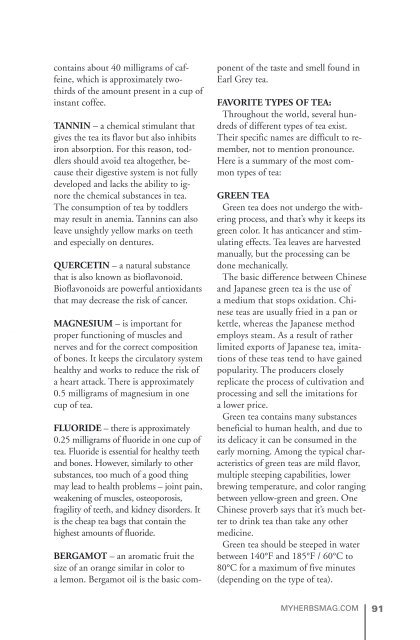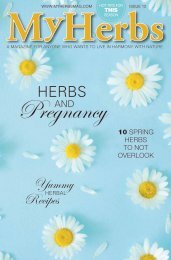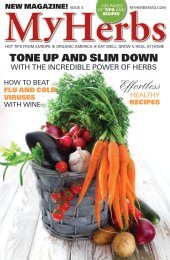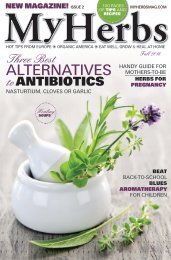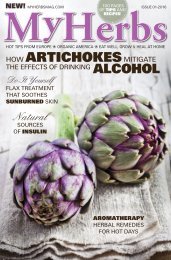My Herbs 1
Find out more on MYHERBS-STORE.COM. My Herbs is a special quarterly publication for anyone who is interested in alternative cooking, home grown herbs, and traditional or complementary medicine or healing methods, simply for everyone who wants to live in harmony with nature.
Find out more on MYHERBS-STORE.COM.
My Herbs is a special quarterly publication for anyone who is interested in alternative cooking, home grown herbs, and traditional or complementary medicine or healing methods, simply for everyone who wants to live in harmony with nature.
Create successful ePaper yourself
Turn your PDF publications into a flip-book with our unique Google optimized e-Paper software.
contains about 40 milligrams of caffeine,<br />
which is approximately twothirds<br />
of the amount present in a cup of<br />
instant coffee.<br />
TANNIN – achemical stimulant that<br />
gives the tea its flavor but also inhibits<br />
iron absorption. For this reason, toddlers<br />
should avoid tea altogether, because<br />
their digestive system is not fully<br />
developed and lacks the ability to ignore<br />
the chemical substances in tea.<br />
The consumption of tea by toddlers<br />
may result in anemia. Tannins can also<br />
leave unsightly yellow marks on teeth<br />
and especially on dentures.<br />
QUERCETIN –anatural substance<br />
that is also known as bioflavonoid.<br />
Bioflavonoids are powerful antioxidants<br />
that may decrease the risk of cancer.<br />
MAGNESIUM – is important for<br />
proper functioning of muscles and<br />
nerves and for the correct composition<br />
of bones. It keeps the circulatory system<br />
healthy and works to reduce the risk of<br />
a heart attack. There is approximately<br />
0.5 milligrams of magnesium in one<br />
cup of tea.<br />
FLUORIDE – there is approximately<br />
0.25 milligrams of fluoride in one cup of<br />
tea. Fluoride is essential for healthy teeth<br />
and bones. However, similarly to other<br />
substances, too much of a good thing<br />
may lead to health problems – joint pain,<br />
weakening of muscles, osteoporosis,<br />
fragility of teeth, and kidney disorders. It<br />
is the cheap tea bags that contain the<br />
highest amounts of fluoride.<br />
BERGAMOT – an aromatic fruit the<br />
size of an orange similar in color to<br />
a lemon. Bergamot oil is the basic component<br />
of the taste and smell found in<br />
Earl Grey tea.<br />
FAVORITE TYPES OF TEA:<br />
Throughout the world, several hundreds<br />
of different types of tea exist.<br />
Their specific names are difficult to remember,<br />
not to mention pronounce.<br />
Here is a summary of the most common<br />
types of tea:<br />
GREEN TEA<br />
Green tea does not undergo the withering<br />
process, and that’s why it keeps its<br />
green color. It has anticancer and stimulating<br />
effects. Tea leaves are harvested<br />
manually, but the processing can be<br />
done mechanically.<br />
The basic difference between Chinese<br />
and Japanese green tea is the use of<br />
a medium that stops oxidation. Chinese<br />
teas are usually fried in a pan or<br />
kettle, whereas the Japanese method<br />
employs steam. As a result of rather<br />
limited exports of Japanese tea, imitations<br />
of these teas tend to have gained<br />
popularity. The producers closely<br />
replicate the process of cultivation and<br />
processing and sell the imitations for<br />
a lower price.<br />
Green tea contains many substances<br />
beneficial to human health, and due to<br />
its delicacy it can be consumed in the<br />
early morning. Among the typical characteristics<br />
of green teas are mild flavor,<br />
multiple steeping capabilities, lower<br />
brewing temperature, and color ranging<br />
between yellow-green and green. One<br />
Chinese proverb says that it’s much better<br />
to drink tea than take any other<br />
medicine.<br />
Green tea should be steeped in water<br />
between 140°F and 185°F / 60°C to<br />
80°C for a maximum of five minutes<br />
(depending on the type of tea).<br />
MYHERBSMAG.COM<br />
91


